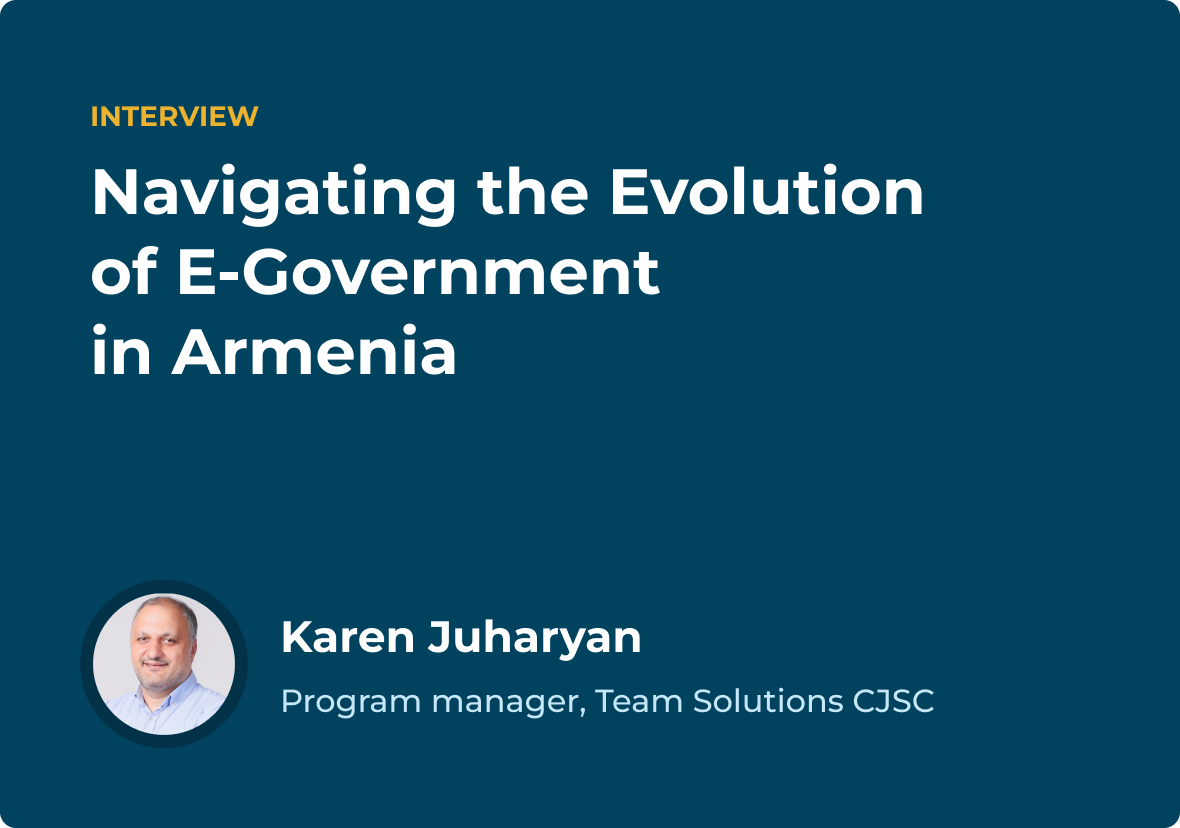
Interview with Karen Juharyan, Program Manager at Team Solutions CJSC
![]() By Anna Malikonyan
By Anna Malikonyan
![]() May 27, 2025
May 27, 2025

![]() By Anna Malikonyan
By Anna Malikonyan
![]() May 27, 2025
May 27, 2025
Q: What are the main challenges Armenia has faced in developing its e-government systems?
Karen: E-government, at its core, is about the digitalization of the state’s key management systems. I’ve been directly engaged in this field for about seven years, though Armenia’s journey toward digital transformation began even earlier. In the initial stages, the development process was highly decentralized. Different government bodies initiated digital projects independently, based on their priorities, available technical resources, and perceived public needs. At the time, there was no overarching framework or unified strategy to guide these efforts. While this led to a variety of innovative solutions, it also highlighted the need for a more coordinated, long-term approach to ensure interoperability and consistency across institutions.
Q: How did this decentralized phase affect the practical implementation of digital systems?
Karen: In practice, it meant that each institution was developing its own systems independently—based on their unique interpretations of problems and available skills. However, over time, practical needs pushed things in a more organized direction.
The State Revenue Committee of Republic of Armenia (SRC) took the lead in this area. With the support of Team Solutions CJSC as the implementation partner the committee developed systems for digital reporting, which was a great support for accountants and business owners, as it was possible to submit tax reports, register employees, and file declarations without visiting the tax office in person. With our continued involvement, SRC also had a clear vision of the full picture—how different systems must be integrated and how digital governance should evolve. Our team at Team Solutions has supported many of these integrations.
Q: What are the main difficulties in creating fully integrated systems across institutions? And what needs to happen to ensure smoother digital governance?
Karen: The primary issue is that these systems are not just technical—they’re built on laws, legal acts, and administrative procedures. If the legal framework isn’t designed with digital implementation in mind, the IT teams can’t make it functional in real life. That’s a huge challenge: the legal and technical sides must move in parallel.
Unfortunately, Armenia still faces gaps in this area. There’s no unified state-wide approach to e-government architecture. But recently, an affiliated body of the government has started work on building common infrastructure—including cybersecurity protocols and shared servers—which is a promising step toward a coordinated system.
We need a centralized, strategic approach at the state level. Legal reforms must be aligned with technical capacity. With structured collaboration, digital transformation can be efficient, scalable, and truly beneficial for citizens.
Q: What is Team Solutions CJSC’s role in building and maintaining e-government systems? And how the digital systems shape financial literacy among Armenian citizens?
Karen: Our responsibility is substantial. As one of the largest digital solutions contractors for the Armenian government, we have built and now maintain some of the most significant digital infrastructures in the country. The systems we support affect not only administrative efficiency but also economic transparency and citizen empowerment.
We work closely with state institutions, as well as with the SRC, on systems that are deeply integrated across multiple departments.
Given how many citizens and institutions interact with our systems daily, the impact is enormous. It’s not just about data exchange—it’s about economic influence, legal compliance, and public trust.
As digital tools become more user-friendly and widespread, individuals are gaining control over their financial activities. When people can open an app or a portal and immediately see how their taxes contribute to the state budget—and where those funds are allocated—it fosters accountability and strengthens civic engagement. It’s an important step toward a more informed, financially literate society.
Q: What are some internal values and working principles that define Team Solutions CJSC's approach to e-government projects?
Karen: At Team Solutions, our core value is quality over speed. We refuse to deliver products that are unreliable or rushed. Our development process is fully transparent to our partners—from the very beginning of a project to the final implementation. They can track the workflow, confirm the technical documentation, monitor testing, and see the evolution of the product in real time.
This openness builds trust and ensures accountability. Our partners can always go back and review the initial specifications, see what changes were made, how testing was performed, and what the logic behind every decision was. Everyone at our company—from the management to the development teams—shares this mindset. We will never compromise quality for speed, and we’re always ready to explain why certain tasks require more time. Our reputation is a collective responsibility, and that reputation is built on two things: technical reliability and clear, respectful communication.
Q: How do you view leadership and team management within your team?
Karen: For me, management is not a formula—it’s more like art. There’s no single correct model. But there are principles that hold true across projects. The most important one is trust.
Each project manager must have the authority to make decisions and the freedom to act responsibly. Every specialist, whether they’re a developer, analyst, or tester, must own their role and perform it with professionalism. It’s not just about tasks—it’s about having a team where everyone is accountable.
Human qualities are as important as technical ones. Mutual respect, understanding, and emotional intelligence play a huge role. If my team managers are doing their jobs well—leading, mentoring, and delivering—then the whole project will succeed. My role is to create an environment where they can thrive, and to ensure the team knows that if something reaches my desk, it has already passed through layers of responsibility.